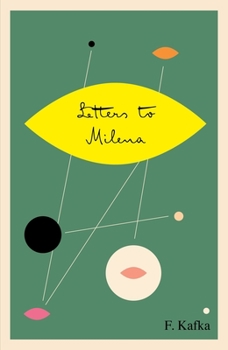Letters to Milena
Select Format
Select Condition 
Book Overview
In no other work does Franz Kafka reveal himself as in Letters to Milena, which begins as a business correspondence but soon develops into a passionate but doomed epistolary love affair. Kafka's Czech translator, Milena Jesensk?, was a gifter and charismatic twenty-three-year-old who was uniquely able to recognize Kafka's complex genius and his even more complex character. For thirty-six-year-old Kafka, she was a living fire, such as I have never seen. It was to Milena that he revealed his most intimate self and, eventually, entrusted his diaries for safekeeping.
Format:Paperback
Language:English
ISBN:0805212671
ISBN13:9780805212679
Release Date:November 2015
Publisher:Schocken Books Inc
Length:320 Pages
Weight:0.79 lbs.
Dimensions:0.9" x 5.2" x 7.9"
Customer Reviews
2 ratings
His best letters
Published by Thriftbooks.com User , 21 years ago
These are Kafka's best letters . He pours forth his broken soul to the woman who can and does understand him. His language is painful and beautiful. Milena the Czech woman married to another Jewish man is too trapped by her life. Their love is impossible also because Kafka within himself is impossible. The letters are powerful and bring a sense of compassion and loss for these two remarkable people who each in his own way ( Kafka through his tuberculosis) Milena ( in a concentration camp) lose their lives when young.
Kafka wrote as a way of not 'turning aside into nothingness'
Published by Thriftbooks.com User , 21 years ago
These letters written by Franz Kafka to Milena comprise my most loved Kafka letters. Writing to Felice, his former fiancée, he was less mature - could he be said to have been less himself? In 'Letters to Milena' he asks at one point (I paraphrase) 'Is it you I really love or the existence that you give to me?' Couldn't any of us ask this question of the person we really love and of ourselves when we really love? I think Milena, whom his biographers considered a far more fitting companion for Kafka than Felice; Milena who in Berlin, years younger than the ageless Franz, living desperately and often pennilessly with her loved hurtful husband (who frequently withheld money from her, so that at one point she worked as a railway porter) - this woman who 'lived her life down to the depths' and who was a writer in her own right - really did give Kafka existence in the years they wrote and too infrequently met. She did not let the nervous, procrastinating and intensely self referential Kafka hide from her - which may be part of why he loved her - and when he is finally prevailed upon to visit her, deliciously drolly reassuring her that if he does get onto a train he will likely as not get off it at the right stop, she does not wait until they each arrive at the much discussed meeting point to actually meet him, but goes unflinchingly to his hotel, cutting off Kafka's apprehensions, making everything in their meeting easy, amicable and precious to him. 'If only it were possible to go to Berlin, to become independent, to live from one day to the next, even to go hungry, but to let all one's strength pour forth instead of husbanding it here, or rather - instead of one's turning aside into nothingness!' Kafka wrote in his diaries in 1914 whilst still engaged to Felice. Milena, for a little while, allowed him to feel he was living, the tragedy was that concurrently Kafka's terrible illness was progressing, depriving him of time and physical energy. He was a man who needed so much time, and who had so painfully little, but, notwithstanding his not infrequent sensation of 'turning aside into nothingness', Kafka lived, he lived his whole life as few, very few, ever do, these letters are a testimony to his intense aliveness and to his genius as a writer. I envy Milena, even though she knew eventually she could not leave her husband for Kafka, she was still the woman who received the treasure of these letters. And yet - a reader has to, bewildered, witness and realize the inevitability and sadness of the eventual cessation of Kafka and Milena's communication, witness Kafka poignantly losing his plans for their future and the idea that Milena can live with him, witness both withdrawing and both mourning. 'M was here', Kafka wrote (again in his diaries, 8th May 1922, when he was more or less housebound with his illness) 'won't come again; probably wise and right in this, yet there is perhaps still a possibility whose locked door we both are guarding lest we open it,






